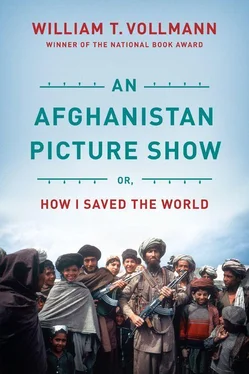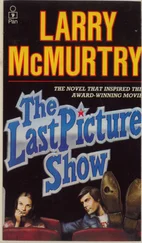Sometimes when the Young Man was at the Jamiat-i-Islami he sat and listened to Professor Rabbani speak. Rabbani was a grave mullah with an iron-gray beard. He sat at a table and talked, and his followers sat motionless on the carpet and listened. The Young Man understood nothing. When there was a break, the Mujahideen smiled at the Young Man and teased him. They touched his shoulder. — “Afghanistan?” they said. — “Yes, yes,” the Young Man replied in Pushtu. “I go there, see Mujahideen fight the Roos.” —“You are white,” they laughed, “too white! When the Roos see you, you must say: ‘ Ya Nooristani; Pukhto na pwaygum.’ ” aAnd they all laughed. — But they did not really want him to accompany them. They thought him too young.
In his notebook he wrote such entries as:
Went to Najib at Jamiat again. He said take as little as possible inside —but must bring passport, Afghan clothes.
Sat around for a long time. Asked Najib what they’d set up for me. Nothing. Group leaving early this week if passes open (blocked by tribal fighting). “If you are lucky you can go with one of these groups.”
“Otherwise how long will I have to wait?”
He spread his hands.
But at least the Young Man could interview the Mujahideen to his heart’s content. He turned on his tape recorder in Dr. Najib’s office. — “I’ve met a number of people who seem to think that the Mujahideen are much less unified than they claim …”
Dr. Najib had the office cleared of other people. “First of all,” he said, “it is unfortunately true that there is not as much unity as we would like, but you might know that efforts are being brought about to make a new organization called Islamic Unity of Afghan Mujahideen.”
“Is there one organization by that name or two?”
There was a pause. — “Two,” said Najib finally. “But I’m talking about the main one, you see; and we are working together, and in a month or two this problem of unity will have been solved. About the other group, it is true that they have established propaganda against our organizations. It must be kept in mind also that the Russians have puppets and agents in this area, and they exaggerate our disunity.”
THINGS THAT PEOPLE WOULDN’T SAY ON TAPE [3]
If a man were to switch political parties, he’d be killed. If my informant’s party were to find out that he told me this, he’d be killed.
The General’s statement
The two of them were sitting out on the patio in lawn chairs. It was hot that day, and the General had turned on a large fan that at least moved the hot air around. Not even a grasshopper stirred.
“So you think their problem is that they’re not willing to compromise?” asked the Young Man.
“Well, they say they must get together. That is one of the first principles of Islam: towhee , oneness. Yet here they are. And there are nine of them, ten of them — all these groups! They ought to be making common cause to kick the Russians out. They are doing it, but individually.”
“Do you think it’s possible for them to stop kidnapping each other and so forth?”
“Traditionally we have a system,” the General said. “You and I are at daggers drawn, and our common well-wisher decides to intervene between us. He says: ‘All right, for two, three months there will be no killing, no kidnapping, no cursing.’ And it is honored. So the differences could be done away with for a limited period — up to six months.”
The Young Man shifted in his chair. “Well, will it happen in this case?”
“The saner elements are not there,” said the General. “The young fellows … Well, the saner elements are inside . Ninety percent of the fighting is going on inside Afghanistan by the people who are there. And those chaps who are over here, they are all very ambitious; they all want the chair. And as they are ambitious, they will probably not get together. I feel we should help the majority, the ones inside . They are starving. And they are fighting your war, my war, the war of the free world. And that help should be extended materially, economically, medically. Most of the fighting takes place May to September. The rest, Afghanistan is under all this snow. Afghanistan was never self-sufficient. And with the present circumstances, the Russians are there; they can’t do any cultivations. These winters are very hard. These winters are very hard. The Russians are so bloody stupid — or clever — that they bombed their harvest and compelled them to beg food from them. So far, the common man has been rejecting these things from the Russians. Well, how long will he go on rejecting it?
“In Panjsher, the person who is fighting there, Masoud, he is paying his own men. He has a full-fledged army of two thousand people of his own. He’s a gemstone dealer: he sells his emeralds and rubies in the United States. You see, fighting inside has to be either on a tribal basis, with individual khanates, or else with those who can afford to wage the war. We must help them, not these bloody parties.” b
* “Thank you for submitting the manuscript,” wrote the literary agent, “and my apologies for my slowness. I hope your intestinal parasites are a thing of the past. I do appreciate the chance to read An Afghanistan Picture Show . I only wish that I could get someone to buy it …”
† I never saw his name transliterated, and am spelling it exactly as it sounds.
‡ See Chapter 8, in which Abdullah is interviewed.
§ This interview, like many others, was conducted in Pushto. I am indebted to my Afghan translator in California (who does not wish to be identified).
‖ I have transliterated his name thus to avoid confusion with Babrak Karmal’s successor, Najibullah.
a “I am Nuristani and understand no Pushtu.” (Nuristanis are often light-skinned.)
b In comparison with their occupiers, the Afghans did quite well, for any person will always come off more favorably than the soldier who has come to dispossess him. Since by the time I wrote this book my sympathies in this matter had come to lie wholly with the refugees and the Mujahideen, I considered hiding or denying what is blighted on their leaf. However, that is not only a bad way to begin (and I am not certain, anyhow, that I would be capable of doing so suavely), but — more to the point — I think it is both unnecessary and inexpedient: unnecessary, because from our viewpoint the stench is hardly noxious, we being, in all respects, on the other side of the world, and because these things that the Afghans do are not of significant harm to anyone but themselves; and inexpedient, because pointing them out will not be “of aid and comfort to the enemy,” the enemy having been clever enough to play on them already. Anyhow, the war is over for the moment.
I think it is like Vietnam. We will have to be here fighting the Russians for five years, ten years, twenty years, fifty years. But finally we will regain our country.
HERAKAT COMMANDER
The red hill [4]
The five of them were in a fine, spacious house in a wooded village. The Young Man could hear the river outside the window. To get up here you crossed a number of tiny makeshift bridges, said “Sta ray machay” to the boys standing seriously under the trees, ignored the girls, who were loaded down with water and firewood, and ascended a ladder. The village was made up of tall, narrowly spaced two-story buildings. The first floor was stables and fodder sheds. Above their cattle the people lived, in houses of wood whose doors were carved in whorled patterns. The malik’s guest chamber was cool, thanks to its thick mud walls, and sluggish with shadows. From the wooden beams hung paper decorations in various colors, which reminded the Young Man of the Christmas tree ornaments he had made in elementary school. Along the length of the far wall ran two lines of pictures — dim family portraits (he supposed, not knowing, not asking) of stern Pathan men; and color prints of mosques in Afghanistan. The wall behind the guests’ heads, however, had been papered from the floor up to the height of a sitting man, for cleanliness. They all stretched out on the floor there, on thick rugs of red, green, white and yellow, with big embroidered pillows against the wall for their heads. In the back of the room were three charpoys , or rope beds.
Читать дальше












